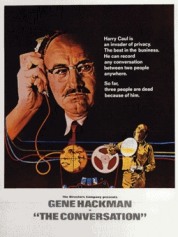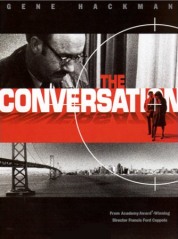|
The Conversation
|
| |
 |
USA, 1974. Rated PG. 113 minutes.
Cast:
Gene Hackman, John Cazale, Allen Garfield, Frederick Forrest, Cindy Williams,
Harrison Ford, Teri Garr
Writer: Francis Ford Coppola
Music: David Shire
Cinematographer: Bill Butler
Producers: Francis Ford Coppola, Fred Roos
Director: Francis Ford Coppola
LINKS
|
 rancis
Ford Coppola is best known for his adaptation of Mario Puzo's The Godfather,
a highly influential and successful film that spawned two sequels. Fans of that
trilogy, then, seeking for more of Coppola's work, may be taken aback by The
Conversation, a studied psychological thriller made between The Godfather
and The Godfather, Part II, and released in the same year as the latter.
The Conversation was nominated for three Academy Awards (Best Picture,
Best Sound, Best Original Screenplay), one of its biggest competitors being,
of course, the second Godfather movie. Even though it went unrewarded,
The Conversation doesn't need the validation of an Academy Award.
rancis
Ford Coppola is best known for his adaptation of Mario Puzo's The Godfather,
a highly influential and successful film that spawned two sequels. Fans of that
trilogy, then, seeking for more of Coppola's work, may be taken aback by The
Conversation, a studied psychological thriller made between The Godfather
and The Godfather, Part II, and released in the same year as the latter.
The Conversation was nominated for three Academy Awards (Best Picture,
Best Sound, Best Original Screenplay), one of its biggest competitors being,
of course, the second Godfather movie. Even though it went unrewarded,
The Conversation doesn't need the validation of an Academy Award.
The focus of The Conversation is its protagonist, Harry Caul (The
Royal Tenenbaum's Royal Tenenbaum, Gene Hackman), a highly secretive
wiretapper living in San Francisco. Coppola pulls the audience into Caul's complex
world as he immerses himself into deciphering a lunchtime conversation between
two young lovers (Cindy Williams, Shirley of "Laverne & Shirley", and Apocalypse
Now's Frederic Forrest) in Union Square. What seems an innocuous conversation
turns cryptic and desperate as Caul weaves through electronic blips and static
to create the master tape, commissioned by a company executive only known as
the director (an uncredited Robert Duvall), and eventually leads to Caul's unwilling
involvement in a heinous plot.
Harry Caul is a man who commits far too much of his time and energy to making
himself invisible and impregnable, yet Caul is just as vulnerable as his wiretapping
victims. His methods are so painfully obvious that even his unintelligent girlfriend
(Teri Garr of Young Frankenstein fame) can see through them. It's nearly
comical how many times his walls of secrecy are torn down by the most ordinary
of characters, but it's clear that each and every one of these violations is
a grievous injury to Caul's psychological well being. He's dumbfounded that
what he thinks are foolproof methods to maintain privacy have been violated.
The Conversation also succeeds as a terrifying psychological thriller.
Often referred to as being Hitchcockian (a term that is thrown around like an
old rag), The Conversation is one of the few films actually worthy of
the description, not only because of suspense, but also because of its reliance
on non-dialogue techniques to tell its story. Like the best of Hitchcock's thrillers,
The Conversation manipulates its audience into the mindset of its protagonist
without being overbearing. We may see things the character does not, but our
suspense is based on our knowledge of the character, his situation, and how
he reacts to it. As Vertigo depends on our intimate knowledge of Scottie
Ferguson, tension in The Conversation stems from how well we know Harry
Caul.
Coppola has brought to the screen a beautifully paced, technically superb thriller,
with excellent performances across the board. In an amazing performance overlooked
by the Academy, Hackman digs into every nuance of his character. The late John
Cazale, better known as Fredo Corleone, plays Harry's assistant, Stan, a man
who likes wiretapping but isn't as into it as Caul. Cazale again shows the potential
he had to become a superb character actor in The Conversation, and it's
a shame he had to die so early in his career. In what little time he has, Harrison
Ford delivers one of his best early performances as the creepy Martin Stett,
and the rest of the supporting cast shine in even the smallest of screen times.
I wouldn't feel right writing a review for The Conversation if I didn't
praise sound editor Walter Murch and composer David Shire. Sound has a pivotal
role in this movie, and these two succeed by luring us further into the story
with their work. Shire's jazzy score is played solely on the piano, adding to
the sparse atmosphere of the film (and to Caul's character, a jazz fan). In
sharp contrast are Murch's bizarre sound effects, which underscore not only
the errors in the recording but Caul's personal conflicts. Without doubt The
Conversation is one of the best movies of all time.
Review
© April 2003 by AboutFilm.Com and the author.


